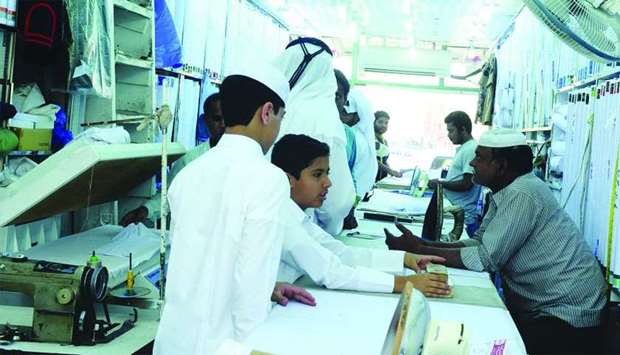With Ramadan set to enter its final phase, textile and tailoring shops in Doha and beyond have started witnessing a steady flow of people eager to buy and stitch new clothes for the upcoming Eid al-Fitr celebrations. Such customers are currently flocking to souqs and stores, where they can find their dress of choice, in large numbers, it is found.
Shop owners say Qataris as well as expatriates prefer sticking to conventional styles during Eid. “This season has not yet seen any trendsetting dresses or patterns. Both Qatari and non-Qatari women are opting for conventional designs,” said Mohamed Ali Kalloorakkal at a ladies tailoring shop in Al Hilal.
His shop receives orders for jalabiya and frocks, among other dresses. Mohamed said things have also gone online as most customers share photographs of their desired designs through WhatsApp. “Customers bring clothes and we take measurements. We follow the designs that they simply share with us,” he said.
According to him, expatriate women, especially those from India and Pakistan, go for conventional churidars. “No transformation is seen while it comes to dress selection. Qataris and other Arabs go for traditional dresses and expatriate women also do the same thing for Eid shopping,” he said.
Souq Waqif, which houses a number of shops, has started feeling the Eid rush. “Shops here were busy for a few days before Garangao. However, they had little to do for some time as the celebrations ended. After a short interval, residents have again started flocking to shops with orders,” said Abdu Rasheed, who runs a shop in Souq Waqif.
Traders in Doha reiterate that there is no change visible in dress selection by men. “As is always the case, Qatari men keep their tradition intact during dress selection. Thobe, the traditional menswear, still rules,” said Khaleel, who runs Mubarak Syed Tailoring at Souq Waqif. He added that expatriates from Arab countries also tend to wear the thobe for Eid celebrations and prayers.
“Non-Arabs also select thobes though it is quite low in number. They go for jubba and pyjama or pants and shirts,” he said.
Demand is also high for skull caps and keffiyehs. “Along with dresses, rings for the head dress and buttons for thobes are also in demand,” said Abdu Rasheed. Traders here expect the final days of Ramadan to bring them good fortune. “Sales have increased by 50%. And we hope it will go further up during the last week of Ramadan,” he added.


